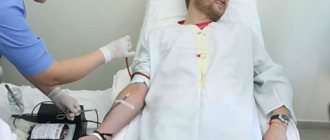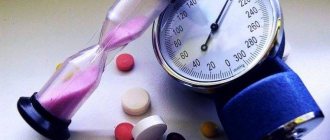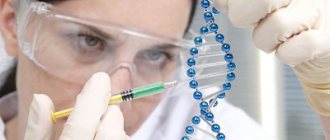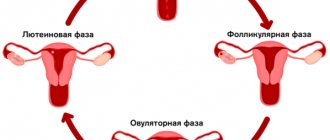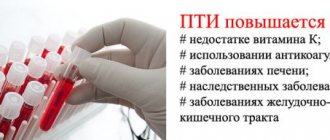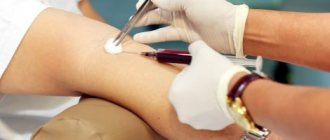Medical research necessary to diagnose many diseases requires a complex of laboratory tests of blood, urine and other biomaterial. Often such manipulations occur at the beginning of the menstrual cycle. There are a number of diseases for which it is necessary to donate blood during menstruation. But when examining many diseases, menstrual bleeding can significantly affect the results of the tests. Why can’t you donate blood during menstruation, and what abnormalities are observed?
Features of bleeding
The menstrual cycle is the period of time from the first day of your period until your next period of bleeding. Normally, this period includes 21–35 calendar days. With normal menstruation, bleeding begins at regular intervals with a permissible deviation in one direction or another of 1-2 days.
You can control the consistency of your cycle using marks in the women's calendar.
This data will allow you to plan certain activities taking into account the menstrual cycle. The same calendar can help you during medical procedures where the onset of your period is important, including clinical urine and blood tests.
During the cycle, the uterus prepares for the upcoming fertilization. In the second (luteal) phase of the cycle, thickening of the endometrial walls is observed. If pregnancy does not occur, the endometrium begins to tear away from the uterine walls, exposing the blood vessels. It is for this reason that bleeding occurs during menstruation.
Urine examination
This is another material that can tell a specialist a lot about the patient. Its components are subject to both external and internal influences. And if the latter carries information about health, then the former can seriously distort the picture. Therefore, urine analysis during menstruation, if you cannot do without it, requires special conditions:
- A woman needs to wash herself immediately before collecting material. It is unacceptable for blood from menstrual fluid or epithelial particles to enter the contents for analysis. However, you need to wash without disinfectants and antibacterial agents. They can also significantly influence the result;
- To prevent menstrual fluid from getting into the urine at the time of collection, it is necessary to insert a tampon into the vagina.
And yet, despite precautions, such a study during menstruation can produce false data:
- A darker color means a violation of the outflow of bile or a malfunction, and with redness - glomerulonephritis. Menstrual blood, once in the urine, can give any color, giving incorrect information;
- The increased specific gravity of the material when particles of menstrual fluid enter will incorrectly indicate or;
- Turbid urine with red blood cells can lead to false confidence that the patient has a malignant tumor of the female organs or excretory system, arterial hypertension, systemic diseases or intoxication;
- A large amount of sediment containing the uterine epithelium, which is very likely to enter during menstruation, will cause the doctor to unreasonably assume that the patient has jaundice, an allergy to medications, or urolithiasis;
- A high level of white blood cells will give misleading information about the inflammatory process in the urinary tract.
Considering all of the above, you should not take a urine test during menstruation unless absolutely necessary. In emergency circumstances, specialists take the material using a catheter directly from the bladder.
What is the reason for this effect on blood counts?
If laboratory blood tests are planned, but they fall during menstruation, then you need to know the changes that occur in the female body during menstrual periods:
- ESR increases, which stands for erythrocyte sedimentation rate;
- there is a decrease in the number of platelets;
- the number of red blood cells, on the contrary, increases;
- blood clotting is activated;
- There are abrupt changes in a parameter such as hemoglobin, which can increase at the beginning of the cycle and then sharply decline.
Deviations in blood parameters affect diagnostic tests for a number of diseases. But at the same time, there are laboratory manipulations that do not depend on the time of collection of the material.
List of blood tests that are not advisable to perform during menstrual flow:
- General blood test, which determines the content of blood particles: leukocytes, platelets, erythrocytes; as well as ESR and hemoglobin.
- Biochemical analysis is carried out to determine the amount of proteins, enzymes, bilirubin, etc.
- A sugar test can identify endocrinological abnormalities.
- A serological test determines the presence of bacteria or viruses in the body.
- Immunological speaks about the activity of the immune system.
- Allergy tests allow you to identify reactions to particularly common allergens.
- Blood clotting shows the viscosity of the biomaterial and any deviations in any direction.
- PCR is characterized by increased sensitivity to foreign DNA and is important in diagnosing urological and gynecological diseases.
- Taking biomaterial to identify tumor markers makes it possible to identify the development of cancer based on the data obtained.
There are diseases for which donating blood is the most accurate analysis: a test for some hormones is carried out on days 2-3 or 5-7 of the cycle to diagnose hormonal abnormalities in gynecological problems.
In all other cases, blood values at the beginning of the cycle differ from the results of tests performed in the middle or end of the menstrual month.
Also, menstruation can serve as an obstacle to taking a urine test. If you do not comply with the necessary requirements and blood gets into the biomaterial, then there may be erroneous results indicating serious health problems, including the development of oncology of the female organs. This may be indicated by darkening or redness of the biomaterial; change in specific gravity; cloudiness of urine with identification of red blood cells in its composition; precipitation; increase in the number of leukocytes.
Urine tests are not performed during menstruation. If a urine test is urgent, and you need to get tested before or during your period, then this must be done in compliance with the basic requirements:
- wash yourself without using antibacterial agents;
- insert a tampon into the vagina, which will avoid drops of blood getting into the biomaterial;
- take a medium portion.
Of course, you remember that the analysis requires the first daily urine, and the containers must be sterile.
Donation places strict demands on the health of those who are ready to donate blood if necessary. Much attention is paid to the functioning of the cardiovascular system, blood pressure indicators, blood quality, and the presence of chronic diseases.
Girls and women who are regular donors know that they should not donate blood during menstruation. But those who play this role for the first time often don’t even suspect
Medical examinations are also carried out upon admission to work or an educational institution. This category of examination may allow laboratory tests at the beginning of the menstrual cycle.
When you may need to undergo a full examination related to any prescription from your attending physician, you need to take into account the characteristics of your menstrual cycle.
- It is advisable to take blood tests 2-5 days after the end of bleeding;
- stop eating 10–12 hours before laboratory tests;
- The collection of biomaterial is carried out in the morning on an empty stomach;
- A urine test is taken taking into account the requirements for collecting material.
Whether it is possible to take tests during menstruation depends on the purpose of laboratory tests. If you need to undergo a medical examination routinely or to identify possible abnormalities in hormone production, then menstruation is not a contraindication. In all other cases, you need to take into account your menstrual cycle.
Many female representatives are interested in the question of whether it is possible to donate blood during the period, and if not, then why not. When answering this question, it is necessary to take into account 2 factors: why blood is donated and what type of research on this biomaterial will be carried out.
What factors need to be considered when donating blood during your period?
In fact, there are no contraindications to this type of research during menstruation. However, when it comes to donation, doctors do not recommend donating blood during menstruation. Without knowing this, girls often ask whether it is possible to donate blood during menstruation, and why not.
The thing is that during this period there is a decrease in total hemoglobin in the blood. This negatively affects the girl’s general well-being. Additional blood loss in the form of donated blood may worsen the situation.
In order to understand whether it is possible to take a blood test during menstruation, a girl must know what happens to the fragile female body during menstrual flow.
So, first of all, during menstruation, the erythrocyte sedimentation rate (ESR) increases significantly. If the doctor deciphering the results does not know that the woman donated blood during her period, then he may mistake the change in this parameter for the body’s response to existing inflammation.
It is also necessary to take into account the fact that the result of the analysis when taking blood from a vein may be distorted due to activation of the coagulation system during this period. During blood sampling, clotting may occur, causing the analysis results to be greatly distorted. Also, in the results of a general blood test during menstruation, in the first days of the cycle, hemoglobin and red blood cells may increase, and then greatly decrease.
When is it permissible to donate blood for testing?
Doctors quite often hear from girls the question of whether it is possible to donate blood directly during menstruation, and why this should not be done.
Modern gynecologists say that you can donate blood for analysis when 3-5 days have passed since your period. This time is usually enough for all blood counts to return to normal.
As for whether it is possible to donate blood for tests during menstruation, doctors do not recommend this for the following reasons.
Hemoglobin decreases during menstruation as a result of natural blood loss. As a result, the blood coagulation system is activated. This factor has a direct impact on such an indicator as viscosity. It is because of this that the results of the biochemical analysis, in which the above-mentioned parameter is established, may be unreliable.
Another explanation for why people don’t donate blood during menstruation is a change in platelet count. This happens as a result of activation of the already mentioned coagulation system. In this way, the female body protects itself from possible excess blood loss. As a result, the resulting analysis results show that the platelet concentration will be slightly lower than normal.
What rules must be followed to obtain reliable analysis results?
Every girl should know how many days after her period she can donate blood. If the doctor prescribes a test during menstruation, you need to tell him about it. In addition, you must adhere to the following rules.
Blood during menstruation
The question of whether it is possible to donate blood during menstruation is relevant for most women. After all, the need to undergo laboratory tests may arise even during menstruation. To understand whether it is possible to donate blood to a woman during her period, you need to know what studies will be conducted. The following types of blood tests are available:
- General clinical analysis - a blood test for such basic indicators as erythrocytes and their sedimentation rate, platelets, hemoglobin, a group of leukocytes and the components of this group.
- Biochemical blood parameters.
- Blood test for glucose levels.
- Hormonal blood tests.
- Serological studies.
- Diagnosis of allergies.
- Immunological blood test;
- Determination of blood clotting level.
- Blood test for the presence of cancer.
- Blood diagnostics using polymerase chain reaction (PCR).
As you can see from the list, there are quite a large number of different blood tests. Some tests can only be taken on a certain menstrual day; some types of tests can only be taken outside of menstruation.
Why you shouldn't donate blood during your period
Menstruation is a process in which the endometrium that has grown during the previous menstrual cycle is shed. Each menstrual cycle begins with a slight blood loss, which lasts on average 4-5 days. As a result, some blood parameters in a woman may change.
- Hemoglobin decreases during menstruation.
- ESR increases due to the inflammatory process as a result of endometrial rejection.
- The number of red blood cells will increase while platelets and white blood cells decrease markedly.
Some women feel quite severe pain in the abdominal cavity during menstruation and take painkillers. They may also cause changes in some blood parameters.
What blood test during menstruation will be informative?
Taking tests during menstruation is the most informative way to find out the amount of hormones in a woman’s body. A girl can safely go for a blood test during her period if the study is carried out for the following hormones:
- Estradiol.
- Anti-Mullerian hormone, which determines a woman's ovarian reserve.
- The steroid hormone is progesterone.
- Prolactin.
- Luteinizing hormone.
- Testosterone.
- Cortisol.
- Other hormonal studies.
Blood tests during menstruation for hormones are usually taken on days 2-3 of the cycle. Some doctors ask their patients to take hormones on certain days of the cycle outside of menstrual flow. For example, prolactin can be taken either on days 2-3 of the cycle, or on day 21.
Is it possible to donate blood for other types of tests?
Of all the types listed above, blood can only be donated for serological testing. If there is an infectious disease in the body, then this will be visible regardless of what day of the cycle the submitted material was received.
As to whether it is possible to take tests during menstruation for the presence of oncology or gynecological infections, there is only one answer - no. If blood is tested during menstruation, the patient most often receives a false positive result.
How and when to donate blood
If the doctor did not indicate certain days of the cycle for taking the tests, and the woman can choose the day for taking the tests, then it is best if at least 3-4 days pass after the end of menstruation. That is, on average, from 7-8 days until the start of a new cycle, blood and urine indicators will be most reliable.
Blood must be donated on an empty stomach; a couple of sips of water are allowed after brushing your teeth. In some cases, the doctor allows you to eat before taking tests. If the specialist did not mention permission to eat, then you should refrain from eating for at least 8 hours before the test.
Do not cross your legs while drawing blood.
After taking the test, it is advisable to eat candy or drink sweet tea. Then the blood glucose level will rise slightly, which means your health will improve.
Sometimes the test date may fall at the beginning of your period. And here the question arises: is it possible to take tests or is it better to postpone the study to another day of the cycle.
This question is relevant for most women, since the need to undergo laboratory tests may arise even during menstruation. To understand whether it is possible to donate blood to a woman during her period, you need to know what studies will be conducted. There are the following types of blood tests: 1. General clinical analysis - a blood test for such basic indicators as erythrocytes and their sedimentation rate, platelets, hemoglobin, a group of leukocytes and the components of this group. 2. Biochemical blood parameters. 3. Blood test for glucose levels. 4. Hormonal blood tests. 5. Serological studies. 6. Diagnosis of allergies. 7. Immunological blood test; 8. Determination of blood clotting level. 9. Blood test for the presence of cancer. 10. Blood diagnostics using polymerase chain reaction (PCR).
As you can see from the list, there are quite a large number of different blood tests. Some tests can only be taken on a certain menstrual day; some types of tests can only be taken outside of menstruation.
Why you shouldn't donate blood during your period
Menstruation is a process in which the endometrium that has grown during the previous menstrual cycle is shed. Each menstrual cycle begins with a slight blood loss, which lasts on average 4-5 days. As a result, some blood parameters in a woman may change.
1. Hemoglobin decreases during menstruation. 2. ESR increases due to the inflammatory process as a result of endometrial rejection. 3. The number of red blood cells will increase while platelets and white blood cells decrease markedly.
Some women feel quite severe pain in the abdominal cavity during menstruation and take painkillers. They may also cause changes in some blood parameters.
What blood test during menstruation will be informative?
Taking tests during menstruation is the most informative way to find out the amount of hormones in a woman’s body. A girl can safely go for a blood test during her period if the study is carried out for the following hormones: - FSH - Estradiol - Anti-Mullerian hormone, which determines a woman’s ovarian reserve. - Progesterone. - Prolactin. - Luteinizing hormone. - Testosterone. - Cortisol. — Other hormonal studies.
Blood tests during menstruation for hormones are taken on days 2-3 of the cycle. Some doctors ask their patients to take hormones on certain days of the cycle outside of menstrual flow. For example, prolactin can be taken either on days 2-3 of the cycle, or on day 21.
How and when to donate blood
If the doctor did not indicate certain days of the cycle for taking the tests, and the woman can choose the day for taking the tests, then it is best if at least 3-4 days pass after the end of menstruation. That is, on average, from 7-8 days until the start of a new cycle, blood and urine indicators will be most reliable.
Blood must be donated on an empty stomach; a couple of sips of water are allowed after brushing your teeth. In some cases, the doctor allows you to eat before taking tests. If the specialist did not mention permission to eat, then you should refrain from eating for at least 8 hours before the test.
Do not cross your legs while drawing blood.
After taking the test, it is advisable to eat candy or drink sweet tea. Then the blood glucose level will rise slightly, which means your health will improve.
Passing a routine medical examination includes a large number of different procedures, including taking a blood test.
Regular menstruation may interfere with the examination, since with its onset some blood parameters change
. That is why it is important to know whether you can donate blood for analysis during your period.
Is it possible to donate blood during menstruation?
During menarche, changes in peripheral blood and hormonal balance occur. Some women experience severe abdominal pain, during which they use painkillers, the presence of which is contraindicated during donation, but is allowed for research of biological fluid.
When taking tests that are not recommended during menstruation, false positive results may occur:
- the presence of inflammation (increased ESR);
- hypoglycemia (low blood sugar);
- insufficiency of the immune system (decreased leukocytes);
- anemia (decrease in red blood cells and hemoglobin);
- decreased level of clotting, which occurs with infections, blood diseases (hemophilia).
Is it possible to take tests during menstruation?
You can take a blood test during your period, however, you must notify your doctor before taking it so that he can make the appropriate note.
.
If it is possible to postpone the test until after menstruation, it is better to do this so that the results of the analysis are more accurate and reliable.
- general;
- biochemical;
- for sugar;
- allergy test;
- for clotting;
- immunological;
- for tumor markers.
During the onset of menstrual bleeding, some indicators change in the blood. If a general analysis is carried out, then based on its results the doctor can say that the red blood cells are settling too quickly. Such indicators at any other time indicate an infection or inflammation developing in the human body.
A blood test during menstrual bleeding may show a decrease in platelets and white blood cells in the blood, but an increase in the number of red blood cells
.
Clotting level
At the same time, the blood level is reduced, as is the hemoglobin content in it, since the woman loses a fairly large volume of blood every day.
It is not advisable to take a sugar test at the beginning of menstruation, since the result most often turns out to be false.
.
Biochemical analysis is not prescribed
during this period, since during menstrual bleeding the biochemical composition of the blood changes, and, therefore, it is impossible to obtain accurate and reliable results.
During critical days, an allergy test cannot be performed.
. The body becomes extremely susceptible. When conducting a test, the results during menstruation are very different from those obtained on other days.
An immunological test carried out to obtain a general characteristic of the immune system for resistance to viruses should not be carried out during menstruation. Its results are most often false positive
. It is necessary to wait at least 7-8 days after the critical days to get reliable results.
Polymerase chain reaction should not be performed in the first days of the cycle. This type of test is prescribed to detect serious problems in the functioning of the body. This requires high accuracy, which cannot be obtained when analyzing during menstruation. Doctors usually prescribe PCR testing in the middle of the cycle
.
For exactly the same reason, tumor marker testing is not prescribed at this time of the cycle.
Blood indicators differ significantly from normal, especially if a woman takes painkillers or antispasmodics.
In order to obtain the most reliable information about the state of the body, it is best to conduct a blood test on the seventh day of the cycle
.
What blood tests are there?
Today there are several types of blood tests, which are carried out in different ways depending on the purpose of the analysis. In short, it is taken to determine the sugar level, an immunological analysis is carried out, the hormonal profile is examined, the blood type, Rh factor, and coagulability are determined. At the same time, analysis for tumor markers will identify proteins that are produced by cells of different tumors.
Experts consider the most informative to be a biochemical blood test, which can evaluate and show the functioning of all internal organs. Such a study also determines the level of sugar, cholesterol, proteins, iron, calcium, etc.
But there are circumstances in which doctors do not recommend that women undergo such procedures during menstruation, since during this period it is impossible to speak with an absolute guarantee about the accuracy of the results obtained.
What tests can I take?
Some of the tests prescribed by doctors must be taken during menstruation or on other, but strictly defined days. This is especially true for hormone tests.
- prolactin;
- estradiol;
- luteinizing hormone;
- cortisol;
- testosterone;
- follicle stimulating hormone.
Blood for FGS, luteinizing hormone, and prolactin are usually donated from days 3 to 5 of the beginning of the cycle. Testosterone should be taken from days 8 to 10, and progesterone and estradiol on days 21–22 of the menstrual cycle.
During menstruation, it is allowed to take a test for syphilis (RW)
. Changes in a woman’s blood at this time do not affect the detection of viruses in her.
Also, if the study is carried out to identify an infectious disease or during a serological analysis, blood is allowed to be donated regardless of the day of the cycle.
If your doctor prescribes a blood test, it is best to ask him whether this procedure can be performed during your current or upcoming menstruation. If he does not give any recommendations, then you can take the test regardless of the day of your cycle. However, most doctors still recommend carrying out the procedure no earlier than 3–5 days after the end of menstruation.
.
You should take a blood test during menstruation just like any other day. That is, on an empty stomach. At the same time, the day before it takes place, you should stop eating fatty, sweet foods, and caffeine-containing drinks. You should also not smoke or drink alcohol. The day before the test, you must stop taking medications.
, which may affect the results of the analysis.
Norm of research results
There are variations of blood tests during menstruation, for which this particular period is convenient. Some blood components are recommended to be checked from the first to the fifth days of menstruation. These include, first of all, numerous hormonal tests. For example, such as: checking prolactin levels, determining follicle-stimulating and luteinizing hormones, studying the levels of cortisol, testosterone and estradiol.
Hormone analysis table
So, as for leukocytes (white blood cells), their number is considered normal if it does not exceed 3.5-10 (measured in thousands per 1 ml). For the female body in the period after menstruation, an increased number of leukocytes will indicate some kind of disorder. However, such a result during critical days often produces incorrect results.
But, if when taking the test, the woman was in normal condition, and there were no monthly discharges, the presence of serious infections in the body should not be ruled out. Such disorders are quite often fungal or viral diseases. In addition, a violation in the number of leukocytes sometimes warns of the progression of bone marrow diseases, the presence of colitis or renal failure. Quite often, an elevated white blood cell count indicates anemia or severe malnutrition.
Red blood cells (red blood cells) in the blood during menstruation should not exceed 3.8-5.8 (measured in million/1 ml). An excessive amount of them is often an alarm bell, warning of problems in the normal functioning of the cardiovascular system, sometimes of poisoning or loss of fluid by the body.
An insufficient number of red cells almost always indicates anemia (here the hemoglobin norm should be 120-160 g/l). And with significantly increased rates, one can assume the spread of chronic leukemia or the presence of serious clotting disorders.
Those who decide to take tests during menstruation should also pay attention to the color indicator in the analysis. Here, fluctuations of 0.85-1.05 are considered the norm. Moreover, if the results are too high, the woman may be suffering from folate deficiency anemia or macrocytosis, and if the level is low, these indicators warn of a decrease in the number of red blood cells.
Before carrying out operations of various sizes, tests are required, including tests for clotting. Any operation is performed with disruption of the skin and mucous membrane, and if this parameter increases, massive bleeding may begin.
The list of possible studies is wide and allows you to find out the condition of internal organs, blood vessels, and the cardiovascular system. Moreover, not only blood clotting changes during menstruation. Each of the studied parameters can be affected by bleeding for 5-7 days.
Hormone analysis directly depends on the day of the cycle. All gland secretions are interconnected, so fluctuations in sex hormones that are sensitive to ovulation and the beginning of the cycle cause changes in other indicators. The study of the reproductive system is carried out on critical days 1-5, that is, during menstruation.
Analysis for tumor markers is also carried out by collecting venous blood. A surge in hormones can cause a distortion of the result, especially since some tumors are hormone-dependent.
You can understand why tests cannot be done in an immunodeficient state by learning about the peculiarities of the functioning of the protective system.
Immune cells are constantly produced in small quantities, their function is to check their own tissues for malignant degeneration and protect against incoming bacteria, viruses and protozoa. Even the slightest change in the constancy of the internal environment causes activation of immune cell synthesis systems.
Some blood tests prescribed by a doctor require special preparation, including for a specific day of the menstrual cycle. In this case, when issuing a referral for analysis, the doctor explains in detail how to donate blood and what rules must be followed. Most often, these requirements relate to hormone studies.
- Prolactin is the main hormone responsible for reproductive function. Production is carried out by the anterior part of the pituitary gland.
- Estradiol is the most active sex hormone in women. Produced by the follicular apparatus of the ovaries.
- FSH (follicle stimulating hormone) is responsible for preparing the female body for pregnancy. Produced by the anterior lobe of the pituitary gland.
- LH (luteinizing hormone) is responsible for the functioning of the gonads. Produced by the pituitary gland.
- Cortisol is a stress hormone produced by the adrenal glands.
- Testosterone is the main male sex hormone. Present in small quantities in the body of women. Produced by the ovaries, adrenal glands, and during pregnancy – by the placenta.
A blood test for luteinizing and follicle-stimulating hormones is recommended to be taken between the 3rd and 5th day of the menstrual cycle. Testosterone levels are examined on days 8-10, and progesterone and estradiol on days 21-22. You can donate blood during menstruation, and the menstrual cycle does not matter for serological testing (syphilis, hepatitis, HIV, infectious antigens, etc.). Menstruation does not affect the activity of viruses. It is not prohibited to conduct research to establish blood type and Rh factor.
Normal blood test values during menstruation
White blood cell counts change during menstruation. Usually their norm is from 3.5 to 10 thousand per 1 ml of blood
. If the rate is elevated, the doctor may suspect an infection or inflammation developing in the body.
The level of red blood cells in the blood usually ranges from 3.8 to 5.8 million per 1 ml
. With an increase in the concentration of these bodies, one can judge problems in the functioning of the cardiovascular system, poisoning and loss of large volumes of fluid.
The level of hemoglobin in the blood during menstruation is usually low. Normal values range from 120 to 160 g/l
. If there is a significant decrease in indicators, the doctor can diagnose anemia. If it increases, there is a high risk of detecting problems with blood clotting and chronic leukemia.
Normal blood color index usually ranges from 0.85 to 1.05
. For diseases such as macrocytosis, folate deficiency anemia, vitamin B12 deficiency. If the indicator is higher than normal, then the reason is the presence of hemoglobin synthesis or a decrease in the size of red blood cells.
The normal hematocrit
%. If the erythrocyte mass ratio increases, then the ratio percentage changes in the same proportion.
If the concentration of red blood cells is reduced, this may indicate bleeding that occurs regularly in the body, as well as hemolysis of red blood cells. Sometimes this indicator is a sign of pregnancy and increased salt concentration.
Before critical days
Often women are also interested in the question of whether it is possible to be a blood donor if menstruation is due in a few days.
Medical experts say that donating biological fluid less than five days before the start of your period is not recommended. This is explained, first of all, by the fact that after collecting blood, the body is exposed to a stressful situation and does not have the opportunity to restore the necessary strength to cope with the subsequent onset of regulation. Even after conducting a blood test, the results of which will most likely show an increase in the level of hemoglobin and red blood cells, the manipulation of transfusion is not advisable. The increased amount of these microelements is aimed at fighting infections and other changes that occur during menstrual periods. It is also not recommended to donate blood during menstruation due to an increase in its viscosity and a decrease in the pain threshold - this will make the usual procedure long and painful.
Blood test during the menstrual break
A blood test taken during the menstrual break is considered quite effective. Especially when it comes to analysis taken on the seventh – fifteenth day of menstruation
.
This is the best time to undergo medical examinations. The body has already recovered from blood loss, but has not yet prepared for the upcoming “cleansing”.
If taking a test is urgently necessary to check the general condition of the body or to prevent illness, then this is the time that is considered optimal. Tests should be taken on other days of the cycle only if absolutely necessary.
, if you need immediate consultation with a doctor or prescription of medications.
It should be remembered that test results cannot in any way become a diagnosis. Only a doctor can identify the exact cause of the disease or deviation of test results from the norm.
Recommendations for donating blood
To undergo laboratory tests, you must follow the recommendations of your doctors. They will help to obtain reliable data in one study.
- You should not eat food 12 hours before testing. During the day - drink alcohol. 2-3 hours before - smoking.
- Laboratory tests are carried out only in the morning, with the exception of hormonal studies.
- Stop taking medications 5 days before donating biological fluid. If this causes a sharp deterioration in health, the drug is not discontinued, but the doctor is warned about it.
- It is not recommended for women to take tests on menstruation days, as the data will not be reliable.
For donation, recommendations are supplemented. Biological fluid cannot be given to persons under the age of majority, pregnant women, lactating women, infectious patients, people with addiction (alcohol, drugs).
Donation before and after the menstrual cycle
If possible, it is worth moving the expected date of blood donation to a safer period. According to doctors, 4-5 days after the end of the critical days, the body completely replenishes lost water, salts and red blood cells. However, this indicator is individual for each girl. To make sure that the body is ready for the procedure, doctors prescribe a number of special tests.
Doctors advise donating at least 5-6 days before your period. Donating blood is a stressful situation for the body; to compensate for losses, it is necessary to mobilize all the regenerative mechanisms of the body. You should not be exposed to it during the period when the body is busy preparing for critical days.
What period is most favorable for analysis?
Since taking blood tests during menstruation is not recommended, you need to know what time is best for this. Before critical days, changes in the body’s condition begin, so most studies are recommended to be carried out 7 days after their end.
The body tries to ensure the safe passage of menstruation, so before it, hemoglobin and red blood cells are increased. This affects blood viscosity and increases the risk of blood clots.
If you do not mention the expected start of the cycle, then problems with blood loss and subsequent restoration of fluid volume may arise.
Each group of indicators has its own optimal period in which it is best to conduct the study. For an immunological analysis to determine autoantibodies to thyroid cells, the most favorable period is days 5-7 of the cycle, that is, immediately after the end of menstruation.
PCR to determine the state of immunity is carried out on days 10-20 of the cycle, the same period is optimal for analysis of tumor markers. A detailed immunoassay will be accurate if performed 7 days after the end of discharge.

